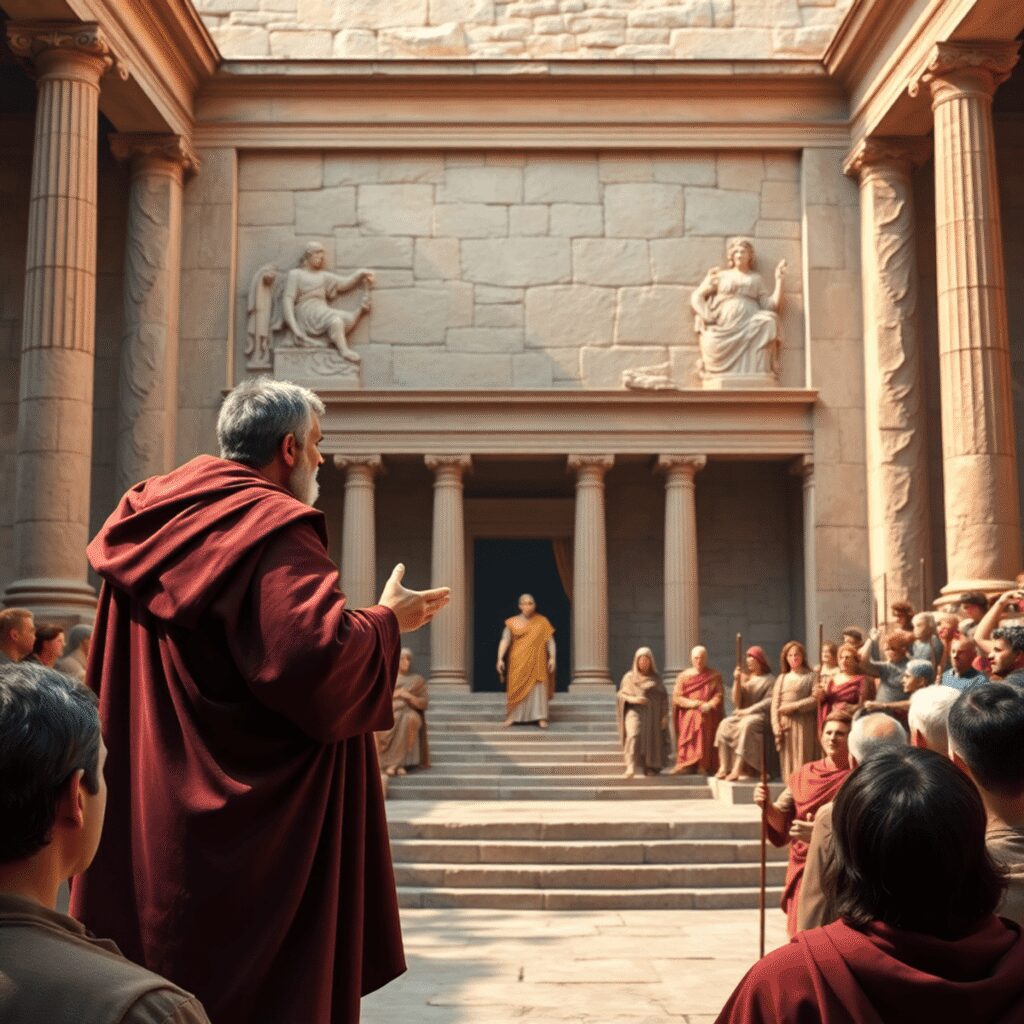The courts of ancient Rome were not just places where legal disputes were settled; they were also theatrical stages where drama unfolded. In this exploration of famous trials and legal dramas in ancient Rome, we will delve into the following key aspects:
Understanding Ancient Roman Courts: We’ll take a closer look at how the courts operated, with a focus on the role of persuasive speaking and dramatic performances in the pursuit of justice.
The Power of Legal Drama: We’ll examine why legal proceedings in ancient Rome were more than just formalities, but rather grand spectacles where skilled orators used their words and actions to sway opinions and influence outcomes.
Legacy of Roman Legal Practices: Finally, we’ll discuss how the legal traditions established by the Romans continue to impact modern judicial systems around the world, including adversarial trials, witness testimonies, and persuasive advocacy techniques.
Historical Context of Roman Legal System
During the Roman Republic, legal proceedings were closely connected to the art of oratory and rhetoric, where persuasive speech played a crucial role in courtrooms. Orators had significant power in influencing judges and juries through their eloquence and ability to sway emotions.
The Role of the Roman Forum
The Roman Forum, a bustling center of political, social, and commercial activities, was the main place where legal proceedings happened. Trials took place here, speeches were given, and important civic matters were discussed. The Forum’s symbolic importance as the center of Roman justice highlighted the public nature of legal drama in ancient Rome.
The Litigious Nature of Roman Society
Roman society was known for being quite litigious, with individuals actively involved in legal disputes to protect their rights or seek revenge. Common issues included disagreements over property, contracts, inheritance, and personal injuries, showing a society deeply engaged in legal complexities.
The Influence on Ancient Rome’s Legal System
The combination of oratory skills, the magnificence of the Roman Forum, and the litigious atmosphere all contributed to shaping the unique legal system of ancient Rome.

Theatrical Nature of Roman Trials
In ancient Rome, trials were not just legal proceedings but elaborate theatrical performances that captivated audiences and influenced outcomes through persuasive public speaking and dramatic courtroom presentations.
Use of Rhetoric and Gestures in Roman Trials
Orators in Roman courts relied heavily on the power of words and non-verbal communication to sway emotions and opinions. They crafted speeches with intricate rhetoric and used gestures to enhance their persuasive techniques.
Lack of Dedicated Lawyers in Ancient Rome
Unlike modern legal systems, ancient Rome did not have specialized lawyers. Instead, individuals with eloquence and ambition could represent parties in court, leading to a diverse range of advocates from different backgrounds participating in trials.
Fame and Social Status Through Courtroom Performances
Successful orators gained fame and social status through their courtroom performances. The ability to deliver compelling speeches and win cases elevated one’s reputation in Roman society, showcasing the importance of eloquence and advocacy skills.
Theatricality was inherent in every aspect of Roman trials, emphasizing the significance of rhetoric, performance, and persuasion in shaping legal outcomes and societal perceptions of justice.

Famous Orators in Ancient Rome and Their Impact on Legal Proceedings
Famous orators played a crucial role in shaping legal proceedings in ancient Rome, with Cicero standing out as one of the most influential figures of his time.
Cicero’s Influence
Cicero, known for his exceptional oratory skills, left a lasting impact on legal practices in ancient Rome. His eloquence and persuasive rhetoric not only captivated audiences but also influenced the outcomes of trials. Cicero’s ability to craft compelling arguments and deliver powerful speeches made him a prominent figure in the Roman legal system.
Gaius Verres Trial
One of the most famous cases that showcased Cicero’s prowess as an orator was the trial of Gaius Verres. As the prosecutor in this high-profile case, Cicero strategically employed various persuasive techniques to sway the jury and secure a conviction against Verres. His meticulous preparation, use of evidence, and captivating delivery during the trial demonstrated the power of advocacy skills in influencing justice.
Impact of Advocacy Skills
Orators like Cicero not only elevated the art of persuasion in ancient Roman trials but also shaped the perception of justice in society. Their ability to skillfully navigate legal arguments, challenge witnesses, and appeal to emotions underscored the importance of eloquence and rhetorical prowess in courtroom advocacy. The legacy of these orators continues to inspire modern legal practitioners in their approach to litigation and argumentation.
Through their strategic use of language and persuasive techniques, famous orators like Cicero set a high standard for advocacy skills in ancient Rome. This period marked a significant adoption of rhetoric which left behind a rich legacy that influences legal proceedings to this day.

Legacy of Roman Legal Practices in Modern Judicial Systems
The legal framework of ancient Rome laid the foundation for many features seen in modern judicial systems. Concepts such as adversarial proceedings—where opposing parties present their cases before an impartial judge or jury—trace back to Roman methods of trial. The emphasis on public debate and contest between advocates created a system where truth emerged through structured argumentation.
Witness testimonies are another cornerstone inherited from Roman courts. In Rome, witnesses played a vital role in establishing facts and swaying jurors, a practice that persists today. The process of calling witnesses to testify under oath ensured that evidence was publicly scrutinized, reinforcing fairness and transparency.
Court procedures have evolved significantly since ancient times to promote justice:
- Early Roman trials lacked professional lawyers; today’s legal representation is specialized and regulated.
- Formalized rules of evidence and procedure have been developed over centuries to prevent abuses common in earlier eras.
- Jury systems have been refined to reduce bias and enhance impartiality.
Roman courts treated justice partly as spectacle, akin to popular entertainment. Orators aimed not only to persuade but to captivate audiences, with theatrics playing a central role. Modern systems, by contrast, emphasize solemnity and impartiality. The courtroom is no longer a stage for personal glory but a venue for objective assessment of facts.
The shift from theatrical performance to serious adjudication marks progress toward fairer outcomes and respect for the rule of law. Yet, the enduring legacy of Roman legal practices remains visible every time you witness adversarial debate, hear witness testimony, or engage with a court proceeding built on centuries-old traditions. This connection between past and present is not just historical; it continues to influence current legal practices and reforms, as seen in various jurisdictions that strive to blend traditional laws with modern principles for better legal outcomes.
Conclusion
The art of persuasion was at the heart of famous trials and legal drama in ancient Rome’s courts. Advocates like Cicero showed how powerful speaking, clever arguments, and dramatic presentations could influence jurors and determine legal outcomes. This skillful communication remains a crucial ability in effective advocacy today, shaping how lawyers present cases and interact with judges and juries.
Roman legal drama had a broader impact than just courtroom procedures; it also deeply influenced societal values by emphasizing ideas of justice and fairness. Trials were public events that reinforced the significance of truth, accountability, and civic duty. These principles not only molded Roman society but also laid the groundwork for modern judicial systems.
It is vital to uphold these timeless values in order to sustain trust in today’s courts. The legacy of ancient Rome serves as a reminder that justice requires not only appropriate laws but also competent advocates who uphold fairness and openness. The drama once performed in the Roman Forum resonates through history as proof of the power of persuasion and the continuous quest for equal justice for all.
FAQs (Frequently Asked Questions)
What was the significance of legal drama in the courts of Ancient Rome?
Legal drama in Ancient Rome played a crucial role in shaping societal values regarding justice and fairness. The theatrical nature of Roman trials, with persuasive public speaking and courtroom performances, not only influenced trial outcomes but also elevated the art of advocacy, leaving a lasting impact on modern legal systems.
How did oratory and rhetoric influence legal proceedings in Ancient Rome?
Oratory and rhetoric were central to Ancient Roman courts, where skilled speakers like Cicero used persuasive techniques and gestures to sway judges and audiences. Since there were no dedicated lawyers, the power of eloquence was vital for advocacy, making courtroom performances both a legal and social spectacle.
Who was Cicero and what was his impact on Roman legal trials?
Cicero was a renowned orator and advocate in Ancient Rome whose mastery of rhetoric significantly influenced legal proceedings. His role as prosecutor in famous trials, such as the Gaius Verres case, showcased his persuasive skills which shaped perceptions of justice and set standards for effective advocacy still admired today.
In what ways have Roman legal practices influenced modern judicial systems?
Modern judicial systems have inherited several key concepts from Roman legal traditions, including adversarial proceedings and the use of witness testimonies. The evolution from theatrical trials in Rome to today’s more impartial court procedures highlights the enduring legacy of Roman law in ensuring fairness and justice.
What was the role of the Roman Forum in ancient legal proceedings?
The Roman Forum served as the central venue for legal activities in Ancient Rome. It was not only a physical space for conducting trials but also a hub where oratory flourished, reflecting the litigious nature of Roman society and providing a stage for theatrical courtroom performances that influenced public opinion.
How did the absence of dedicated lawyers affect courtroom dynamics in Ancient Rome?
Without dedicated lawyers, courtroom advocacy depended heavily on individual orators’ rhetorical skills. This led to highly theatrical trials where persuasion through speech and gestures was paramount. Such dynamics elevated social status for successful advocates and made legal drama an integral aspect of Roman judicial culture.

